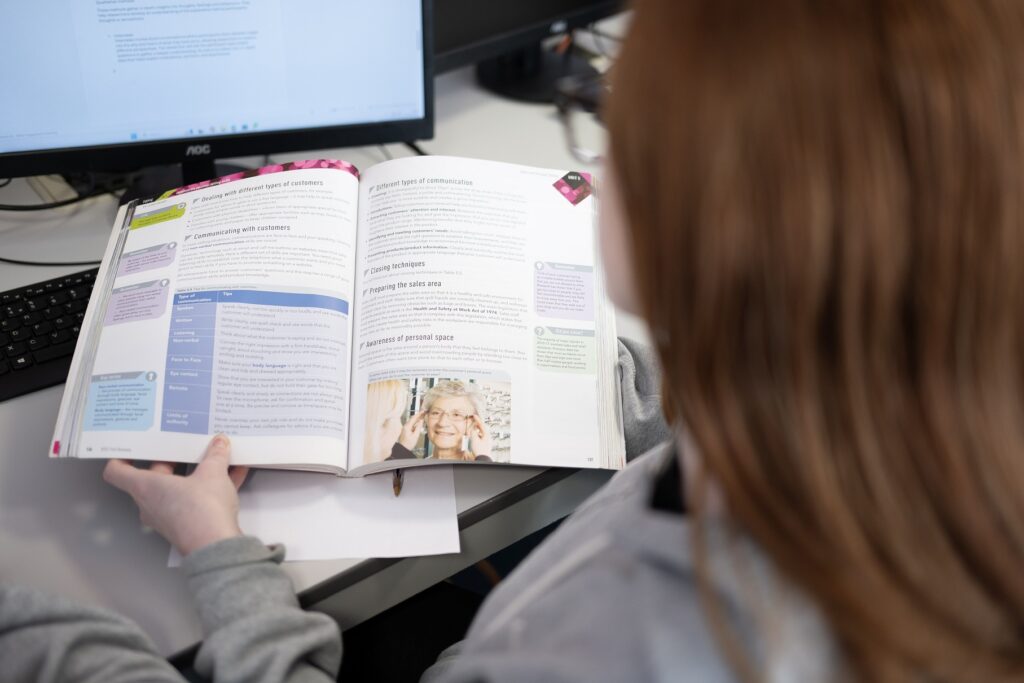Exam study skills are what will help you prepare for and do well in your exams. They include things like understanding how to break down questions, managing your time during exams, staying calm under pressure, and knowing how to structure your answers.
These skills are important because they help you show what you know clearly and confidently. Even if you’ve revised loads, using good exam techniques can make a big difference to your results.
Read on to hear from Programme Director for Maths, Kelly Hough, as she shares her recommended steps for mastering exam study skills.

Step One: Understand your Learning style
We all learn differently, so when it comes to enhancing your study skills, it’s really important to find a learning style that works for you.
There are four main learning styles, with many people often falling into more than one group. Read below to explore them all and have a think about how you like learning.
- Visual – “I learn best with visual aids, such as mind maps, charts, diagrams and videos.”
- Auditory – “I learn best when I hear topics being talked about, or when I can verbally communicate my thoughts.”
- Reading/Writing – “I learn best when I have access to notes, summaries, lists or other texts around a topic.”
- Kinaesthetic – “I learn best when I can use my physical senses to help, such as by taking part in experiments or practical activities.”
Effective revision methods often include flashcards, mind maps, teaching others, practice questions and summarising your notes. Ideally, you should match your methods to your learning style so that you keep in more information.
Now that’ve found a style or styles that work for you, it’s time to move onto the next step.

Step Two: Build a Study Plan and Revision Timetable
Having a study plan and/or revision timetable in place will make your goals become more manageable, and encourage structures in your learning.
Our key tips to start creating these include:
- Break topics into manageable chunks
- Use a calendar or a planner
- Mix subjects to stay engaged
- Include breaks and days off in your revision
- Review and adjust your guides weekly
- Consistency is key
Step Three: Practice Active Learning
Active learning is where you gain new ideas by taking part in activities like problem-solving, discussion, group work and reflection.
By practicing this, you will build a deeper understanding of your subject and be able to link topics to previous information.
Some good ways we do this with students includes:
- Summarising key concepts
- Regular small quizzes
- Explaining concepts aloud as a group
- Analysing mistakes and learning from these
If you aim to understand an idea rather than simply memorise it, you’re more likely to remember it in the future.

Step Four: Use Past Papers and look at Mark Schemes:
Looking at past exam papers is a great way to prepare for exams and strengthen your understanding of a subject.
They help you get familiar with the format of questions, identify patterns in questions, understand how marks are awarded and the level of detail expected in answers.
Taking part in these will also help improve your time management skills when it comes to the real thing.
Step Five: Reflect on your learning
Taking time to reflect on your learning helps you understand what’s working well and where you can improve. It also encourages you to think about how you approached tasks, what you found challenging, and how you might do things differently next time.
Here are some questions to ask yourself:
- What are my strongest topics?
- Where do I struggle the most?
- What has helped me improve?
- What should I change going forward?
By tracking your progress over time, you’ll start to see patterns in your learning and build stronger methods of revision that support your success.

Our Final Tips:
- Start early with your revision
- Stay consistent with your schedule
- Think about making progress, rather than perfecting topics
- Reach out for help when needed
- Celebrate all your success, no matter how big or small
- Get plenty of sleep before an exam
- Take regular breaks when you revise
By finding a study style that works for you, staying organised, and looking after your wellbeing along the way, you’ll be setting yourself up for success.
Exams can feel challenging, but with steady preparation and the right techniques, you can approach them with confidence and give yourself the best chance to achieve your goals.
If you’re not currently studying with us, why not start your educational journey today by exploring our English and Maths courses.


